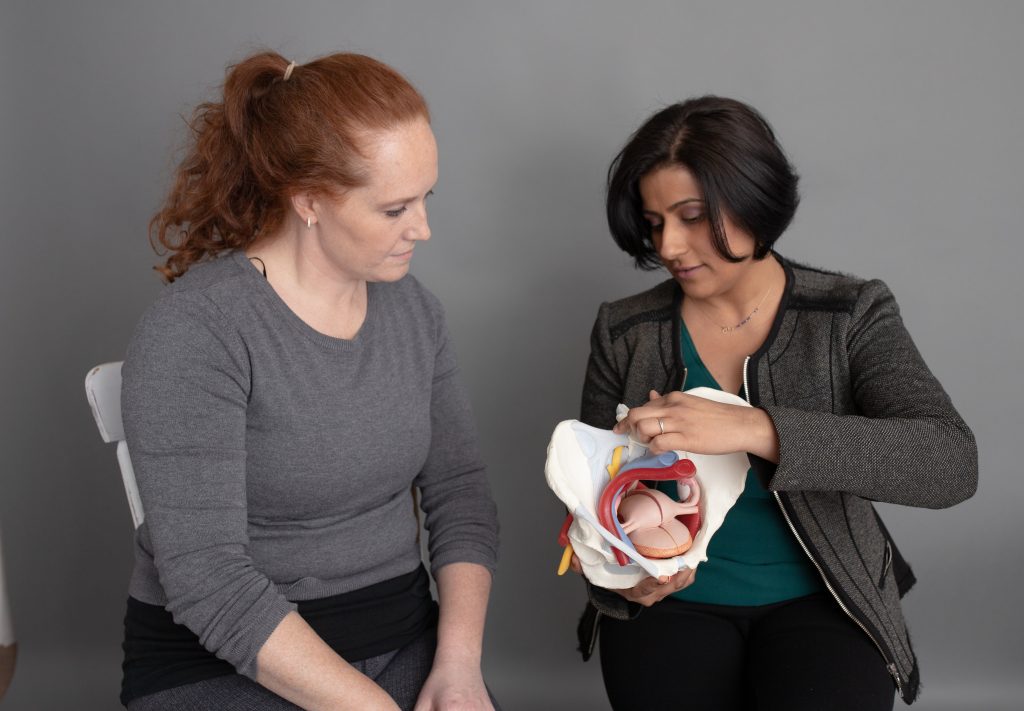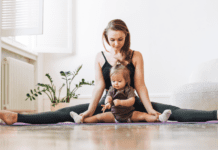
One of the most common complaints from new (and not so new) mamas in my clinic is bladder troubles. More than their baby, their bladder is often running their life. They think twice before committing to a two-hour car ride. They cross their legs before they laugh or sneeze. They wear black to hide the occasional accident. They run to the bathroom as soon as they enter their home. They take every chance to pee and still live as prisoners to their bladder.
A normal bladder can hold about two cups of water and comfortably fills for about 3-4 hours. Bladder filling and emptying seem like a reflex (an automatic function) to many. But the reality is that we have a lot of control over our bladder function. Our bladder learns our patterns and slowly reinforces them over time. We learn our habits early on, and we carry our habits into our adult life. Unfortunately, many of these habits are not healthy. They may even lead to bladder problems like urgency (a strong, uncomfortable need to empty the bladder), frequency (having to go the bathroom too often), nocturia (going to the bathroom at night), and even urinary incontinence (leaking urine any time you don’t mean to).
The bladder, like kids, is TRAINABLE!
Many of us inadvertently train our bladder to work against us. Without realizing it, we might be setting ourselves up for bladder issues through our everyday actions. Let’s talk about small ways that we can change our habits and make our bladders happy!
1. Going to the bathroom “just in case.”
This often starts as an innocuous habit to “pee when the kids pee” or pee every time you put the baby down for a nap. Many moms save time by peeing before they get their baby from the crib. Good idea, right? NOPE.
The bladder is a muscular sac that can hold a lot of liquid. If we get into the habit of emptying the bladder when it isn’t full, it learns that it isn’t important to fill. Once the bladder learns this, it starts giving us urges before it fills to its capacity. Over time, this can lead to urinary urgency and frequency.
Try this instead: Wait to go to the bathroom until you need to. Typically, this should be about 3-ish hours after the last time you went, unless you are chugging water. Try not to go if you don’t feel any urge. It’s just not worth it.
2. Hovering over the toilet seat.
Very common in women who are cleanliness conscious or “germophobe,” this is when a person hovers over the toilet to “do the business” without sitting down or touching the toilet seat This air squat seems like a perfect strategy to acquire the position of peeing, staying clean and working some muscles at the same time. Right? NOPE.
While I am all for squats every day, above the toilet seat is one place I’d like you to avoid. Maintaining an air squat requires increased contraction of your pelvic floor muscles. When you squat while peeing, you contract the muscles that you’re supposed to relax. It gives your bladder extra work to “push the pee” out or causes a slow stream. It may also cause incomplete emptying of the bladder. All these things may lead to insufficient or unstable bladder muscle function in the long term.
Try this instead: Carry an antiseptic wipe or a toilet cover when you go out. Clean the seat, and then SIT DOWN. Wash your hands often and use alcohol-based hand sanitizer if you are worried about getting sick.
3. Not drinking enough water to avoid having to go (or to prevent leaking).
Most people intuitively think that more water in will equal more water out. Maybe we are trying to cut down on our trips to the restroom, or perhaps we already have a problem with urinary leakage that we want to fix. It would stand to reason that drinking less water will help control leaks and urgency, right? NOPE.
While decreased fluid intake may slow down bladder filling, it can also lead to concentrated urine sitting in the bladder. This concentrated urine (which often looks dark yellow and has a strong odor) is known to irritate the bladder’s lining. When the bladder lining is irritated, the bladder will try to empty more to clear out the said irritant. So you see, less water can cause you to pee more often!
Try this instead: Stay hydrated! If you’re worried about leaking, pace your water intake throughout the day. Instead of not drinking for several hours and then chugging the whole tumbler down, try to drink a few sips of water every hour. Also, try to cut back on known bladder irritants if you want to decrease frequency. These might include caffeine, alcohol, artificial sweeteners, acidic foods, processed foods, and carbonated beverages. More than water, these chemicals irritate the bladder lining and cause frequent urges to pee.
4. Waiting too long to go.
While going too often is the usual complaint in my clinic, it usually starts from the other extreme of things. Especially in busy mom life, there are times that we ignore our body’s cues. We’ve all been there, working hard, in the zone, taking care of business, and then it hits us. We can’t remember the last time we went to the bathroom. We remember going in the morning, yet here we are eight hours later and haven’t had time to stop all day. So we must be doing very well with training our bladder! NOPE.
A healthy bladder should need to empty itself every three to four hours. If the bladder is regularly forced to fill beyond its normal capacity, it can cause the bladder muscle to get overstretched. If the muscle fibers get stretched out, they can’t contract effectively. This can lead to incomplete bladder emptying, which might, in turn, lead to increased urinary frequency as the bladder tries its best to empty.
Try this instead: Go to the bathroom when you need to go. Listen to your body and listen to what it’s telling you. If you have an urge to go and it has been 2-3 hours since you last went, don’t ignore the urge. Put the baby down and pee! If you’re not getting any urge to pee after four hours, you are probably not drinking enough water!




















